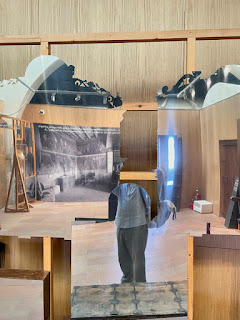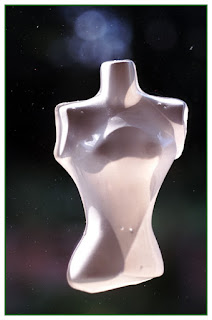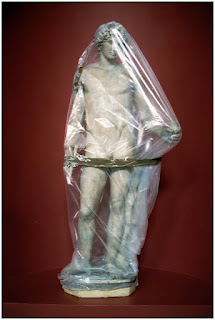As this strange summer finally started to relax its chokehold on my urge to do anything much, and the unaccustomed stretch of idleness began to bother me, I caught myself half-hearing the words you must change your life, almost as if dictated by a voice in the wind. Which may require some explanation, if you are not to doubt my sanity.
So, just as a preliminary, how are you with poetry? It seems to make a lot of people feel awkward these days. It's certainly not generally well taught any more, at any level, which means fewer and fewer people are learning to encounter their own language in its purest, most playfully serious mode. I find this sad, not least because in many ways it was a talent for poetry that catapulted me into that category of oddballs labelled "susceptible to education (but not of any useful sort)".
Fortunately, this was not so much a talent for writing poetry—that would have been a curse too far—as for reading and interpreting poetry. Which is an idiotic talent, to be sure, but one which used to be more remunerative than actually turning out the stuff. So, had you ever needed the plumbing or wiring of a difficult poem sorting out, I was your man. I don't think there used to be a Yellow Pages section for literary interpreters but, if there was, that would have been me with the big banner advert. [1] Unfortunately, the bottom had already dropped out of the interpretation business by the late 1970s, so that's not how I ended up making a living. I did seriously consider diversifying into the theory racket, but quickly realised that I would only end up in that notorious dark wood, the straight way lost, where all theorists of the untheorisable are destined to end up, and decided to get a proper job instead.Despite the dwindling job market for poetry maintenance, however, some actual poems do remain as key to our culture, in their quiet way, as do our more famous paintings and musical compositions, and really should be as well known. They're generally not, though, and—just to make it that little bit more difficult—they're not all written in English (in stark contrast, you rarely hear it said that paintings are rendered incomprehensible by the use of, say, French, German, or even Chinese paint). Robert Frost was undoubtedly right when he remarked that poetry is what is lost in translation, but in our increasingly monolingual anglophone world essential work is done by those intrepid armchair explorers of the broader culture who continually rediscover and retranslate foreign-language literary touchstones.
The poem is famous for its startling closing line —"You must change your life"—which, on the face of it, looks like the sort of sententious finger-wagging beloved of the self-help and therapy crowd. But that is to miss the point, rather like fixing on "neither a borrower nor a lender be" as the key to Hamlet. At its simplest, it's an example of an ekphrastic poem ("verse on art objects"), but it invites deeper reflections on just who is looking at who in the encounter with art. Ursula K. Le Guin (yes, that Ursula K. Le Guin) said of it:
True myth may serve for thousands of years as an inexhaustible source of intellectual speculation, religious joy, ethical inquiry and artistic renewal. The real myth is not destroyed by reason. The fake one is. You look at it and it vanishes. You look at the Blond Hero - really look - and he turns into a gerbil. But you look at Apollo, and he looks back at you.Personally, I think she, too, half misses the point, not helped by that comparison with, of all things, a gerbil. Rilke often wrote about angels and figures from myth, and even claimed to take dictation from voices in the wind—hey, we've all been there—and it can be hard to be sure whether or not he expected us to understand them as anything more than convenient armatures or vivifying metaphors handed down to us from antiquity. If you want my interpretation of the poem, my rates are very reasonable. But, as I say, I hung up my hermeneutical hat four decades ago, so it may not be up to current specs. [2]
This poem has always intrigued me, however, ever since I first read it at school as a sixth former, and many years ago now I proposed a project to a teaching colleague in the German Department along these lines:
Hi Andrea,
At the moment, I'm still thinking about the thing I mentioned the other day and it may well come to nothing, but: what I have in mind is a project pulling together a variety of interpretive contributions from staff/students working within the University, focussing on a single poem. I suppose I have a slightly naive vision of, on the one hand, a class of German students creating visual art and, on the other, certain artists engaging creatively with poetry in a foreign language. If a viable project plan does emerge, I will try to interest either [X] at the [Y] Gallery or [...] at the [...] Gallery in an exhibition / publication.
From my p-o-v, I'm fascinated by the way the visual and the literary interact, and the whole business of translation / transmission between languages, cultures and different expressive means. The Rilke suggested itself as a choice, partly because of its intrinsic concerns, and partly because it has been so frequently translated and variously interpreted. It also seems auspicious that you teach it yourself in your classes. Such a project would obviously benefit enormously from your linguistic expertise and insight (as you know, I do have some competence in German, but I am baffled, for example, by the various translations of "sein unerhörtes Haupt" as "legendary", "fabulous", "terrific", etc.).
What do you think?
The project never did come to anything beyond some interesting conversations—at the time we both had children in the university Day Nursery, and it's always a relief for parents to talk about anything other than toddler-related matters—and, sad to say, that colleague has since died.Mike
Anyway, around that time I stumbled across what I think is a brilliant rendering of Rilke's poem that seems to uncover a dimension beyond the mythological "heavy breathing" that most translators focus on. It's funny, too. It seems to have vanished from the Web now, so I've taken the liberty of transcribing it here. I hope the author won't mind this publicity.
Archaic Torso of Apollo, a Translation for Bored Children.
After Rilke, by Catherine J. Coan
eyeball ripening
in the head
candle in the chest
in and of
and in itself
and of it
did you know
you didn't know
loins
smile
don't think of buttcrack
here you mustn't think of it
think of the shoulders
or a waterfall
you see
a cat and a star
and an unframed frame
and here is the thing
don't think buttcrack
otherwise you'll never
beget what he meant
no snickering
this is a museum
the statues have no arms
because they fell off
from strangling stupid kids like you
do you want to be a serious poet or what






No comments:
Post a Comment